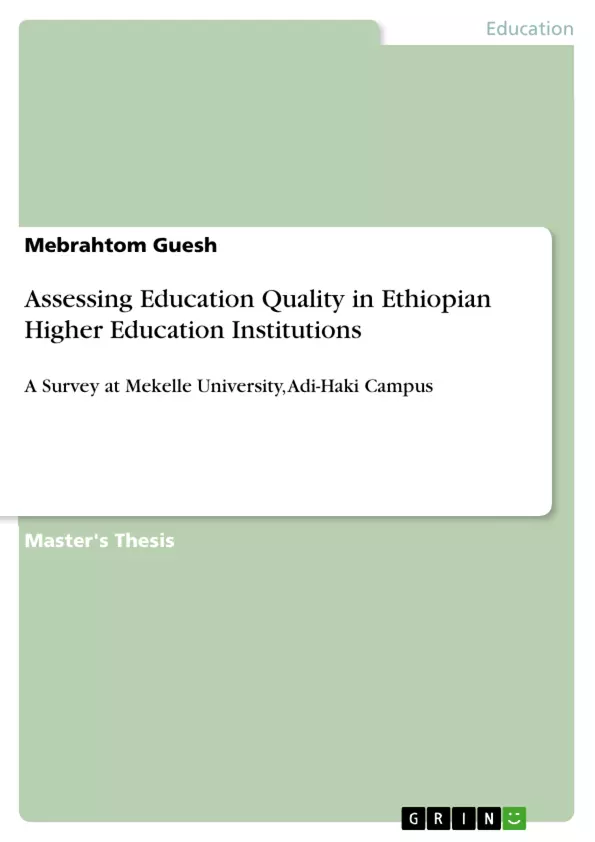Education has received increased attention by the current government of Ethiopia in the recent years because it is believed to be a long term determinant of sustainable development. To this extent, the importance of educating people to ensure a country's continuous competitiveness and sustainable development is unquestionable. Because expanding and reforming higher education and research in a country will contribute significantly to alleviate problems such as suffering from relatively slow social and political progress, and becoming increasingly marginalized from the world economy. The purpose of this study was to examine education quality of input and process factors more emphasis on college resources and infrastructural perspectives, and the role of Quality assurance in ensuring Quality education in Mekelle University particularly in Adi-Haki campus. In line with the research questions and objectives, both qualitative and quantitative methods of data collection have been used for this study. To find out the research questions, survey has been conducted with two questionnaires for teachers and students (121 students and 56 academic staff members) of the selected colleges. Beside this, four individuals i.e. Academic V/president of Mekelle university and Quality Assurance Head Offices of the selected three colleges has been interviewed to support the data which is collected through Quantitative way. After collecting data and information and analyzing it has found that educational quality of the selected colleges are not providing quality of education and the reason is that lack of motivation, inadequate e-learning materials, poor salary and allowance package, pitiable research inputs and outputs, shortage of financial and lack of managerial capacity, availability of corruption, political intervention, less educational qualification of Instructors i.e. below the required minimum standard to give instruction at degree level and difficulty of conducting the teaching-learning process effectively because most of them were not acquainted with the concept of pedagogy are among the constraints which were deduced by the respondents. Additionally, students‟ satisfaction level is low on campus facilities, library and internet facilities, and academic competency of their instructors.
Inhaltsverzeichnis (Table of Contents)
- Abstract
- Acknowledgement
Zielsetzung und Themenschwerpunkte (Objectives and Key Themes)
The main objective of this study was to assess the quality of education at Mekelle University's Adi-Haki campus, focusing on input and process factors, particularly college resources and infrastructure, and the role of quality assurance. The study utilized both qualitative and quantitative methods to achieve this.
- Assessment of education quality in Ethiopian higher education institutions.
- Analysis of input and process factors affecting education quality (resources, infrastructure).
- Examination of the role of quality assurance in ensuring quality education.
- Evaluation of student satisfaction with campus facilities and instructors.
- Identification of constraints impacting the quality of education.
Zusammenfassung der Kapitel (Chapter Summaries)
Abstract: This study examines the quality of education at Mekelle University's Adi-Haki campus, focusing on input and process factors. It highlights the importance of education for sustainable development and explores the challenges faced by Ethiopian higher education institutions. Both qualitative and quantitative data were collected through surveys of students and faculty, as well as interviews with university officials. The findings reveal that the quality of education is hampered by factors such as lack of motivation among faculty, inadequate learning materials, low salaries, poor research inputs, financial shortages, managerial deficiencies, corruption, political intervention, and inadequately qualified instructors. Student satisfaction is also low regarding campus facilities, library resources, internet access, and instructors' academic competency.
Schlüsselwörter (Keywords)
Higher Education, Education Quality, Quality Assurance, Input-Process-Output Model, TQM
Frequently Asked Questions: Mekelle University Adi-Haki Campus Education Quality Study
What is the main objective of this study?
The primary goal is to evaluate the quality of education at Mekelle University's Adi-Haki campus. This involves analyzing input and process factors, such as resources, infrastructure, and the effectiveness of quality assurance mechanisms.
What methodologies were used in this study?
The research employed both qualitative and quantitative methods. These likely included surveys of students and faculty, interviews with university officials, and potentially statistical analysis of data.
What are the key themes explored in this study?
Key themes include the assessment of education quality in Ethiopian higher education, the impact of input and process factors (resources, infrastructure) on quality, the role of quality assurance, student satisfaction, and the identification of constraints hindering quality education.
What are some of the key findings of the study?
The study revealed that several factors negatively affect education quality. These include faculty motivation, inadequate learning materials, low salaries, poor research inputs, financial shortages, managerial deficiencies, corruption, political intervention, and inadequately qualified instructors. Student satisfaction was also low concerning campus facilities, library resources, internet access, and instructors' competence.
What factors negatively impact the quality of education at Mekelle University's Adi-Haki campus, according to the study?
The study identifies a range of factors, including a lack of faculty motivation, insufficient learning materials, low faculty salaries, poor research infrastructure, financial constraints, managerial shortcomings, corruption, political interference, and underqualified instructors. Inadequate campus facilities and resources, such as the library and internet access, also contribute to the problem.
What is the significance of this study?
The study contributes to understanding the challenges faced by Ethiopian higher education institutions and offers insights into improving education quality. It highlights the importance of addressing various factors, from resource allocation and infrastructure to faculty development and quality assurance mechanisms.
What are the keywords associated with this study?
Higher Education, Education Quality, Quality Assurance, Input-Process-Output Model, TQM.
What is included in this language preview?
This preview provides the title, table of contents, objectives and key themes, chapter summaries, and keywords of the full study.
- Citar trabajo
- Mebrahtom Guesh (Autor), 2012, Assessing Education Quality in Ethiopian Higher Education Institutions, Múnich, GRIN Verlag, https://www.grin.com/document/300103



